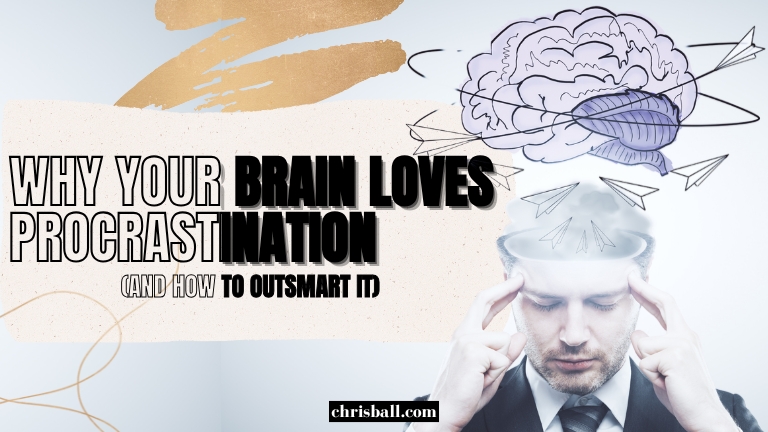Let’s get this out of the way—procrastination isn’t laziness. If it were, you wouldn’t feel that gut-punch of guilt when you scroll TikTok instead of finishing your proposal. You wouldn’t lie in bed replaying the list of things you didn’t do today. Procrastination feels bad because your brain is at war with itself—and the wrong side keeps winning.
So why do you freeze, and how do you stop the cycle? Let’s unpack what’s really happening upstairs.
The Science Bit: Meet Your Inner Tug-of-War
Your brain has two main players in the procrastination game:
- The Prefrontal Cortex: This is your rational, planning part. It loves calendars, structure, and getting things done.
- The Limbic System: This is the emotional, instant-gratification part. It loves Netflix, biscuits, and avoiding discomfort at all costs.
When you procrastinate, the limbic system hijacks the wheel. That’s why answering a tough email suddenly feels impossible, but reorganising your sock drawer feels urgent and weirdly rewarding. Your brain isn’t broken—it’s just picking the easier reward.
Why You Freeze
Three common brain traps keep you stuck:
- Fear of Failure
That email, report, or project feels risky. What if it’s not good enough? Your brain decides to protect you by avoiding the task altogether. Irony: the avoidance makes the outcome worse. - Future Discounting
Your brain prefers rewards now, not later. A biscuit today beats the satisfaction of a finished project next week. - Overwhelm
Big tasks look like mountains. Your brain panics, releases stress hormones, and whispers: “Maybe tomorrow.”
Sound familiar?
How to Break the Cycle
The good news—you can trick your brain into cooperating. Here’s how:
- Shrink the Task
Don’t “write the report.” Write one messy paragraph. Don’t “organise the garage.” Move one box. Action shrinks the fear, and once you start, momentum builds. - Play the 15-Minute Rule
Set a timer for 15 minutes. Promise yourself you can stop after that. Most of the time, you’ll keep going because starting was the hard bit. - Make Rewards Immediate
Tie boring tasks to small treats. Finish a draft? Make a fancy coffee. Tackle three emails? Watch a YouTube clip guilt-free. Your brain loves quick wins. - Label the Disguise
Ask: am I really “researching,” or am I stalling? Naming the avoidance makes it harder to justify.
Borrow Accountability
Tell someone what you’re doing and when you’ll finish. Suddenly, the task isn’t just between you and your excuses.
A Real-Life Example
Take Maya, a student who dreaded starting her dissertation. The word count alone froze her brain. Every time she sat down, she found herself “accidentally” deep-cleaning the kitchen.
Her fix? She broke her work into 200-word chunks and gave herself a reward for each one. She texted her friend after every section. Within two weeks, she had more than half her dissertation drafted—without ever feeling like she had to “write a giant thesis.”
She didn’t beat procrastination by becoming superhuman. She outsmarted her brain’s panic loop.
Questions to Ask Yourself
Next time you’re frozen, try this quick self-check:
- What am I actually afraid of here?
- Can I make this task smaller?
- How can I make the first step ridiculously easy?
- What’s one reward I can give myself when I finish?
These questions break the fog and get you moving.
Why This Matters
Procrastination doesn’t just waste time—it drains energy. The mental load of avoidance is exhausting. Once you act, even in a tiny way, you release that pressure. Your brain relaxes. You feel lighter. That’s why starting is often more rewarding than finishing.
So don’t wait for motivation to knock on your door. It rarely does. Action comes first—motivation follows.
Final Nudge
Your brain will always try to protect you from discomfort. That’s its job. But discomfort isn’t danger—it’s growth. The more you practise starting, the less power procrastination has.
So what’s your stuck task right now? The one you’ve been circling for days or weeks? Write it down. Break it down into a manageable step that you can start with. Set a 15-minute timer.
You don’t need a perfect plan. You just need to start.
Because your brain on procrastination is messy. But your brain after action? That’s where momentum—and relief—lives.
